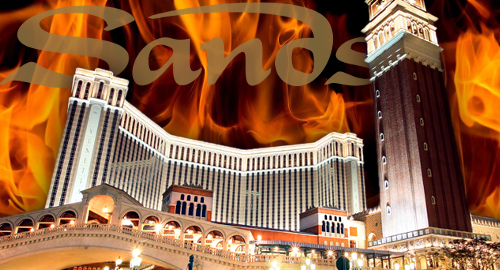 Casino operator Las Vegas Sands lost nearly a billion dollars in the three months ending June 30 as COVID-19 rolled 7’s in Las Vegas, Macau and Singapore.
Casino operator Las Vegas Sands lost nearly a billion dollars in the three months ending June 30 as COVID-19 rolled 7’s in Las Vegas, Macau and Singapore.
Figures released Wednesday show Sands generated revenue of just $98m in Q2, down 97.1% from the same period last year. Adjusted earnings swung from $1.27b in Q2 2019 to a negative $547m in the most recent quarter, and Sands booked a net loss of $985m versus net income of $1.11b one year ago.
The downturn is obviously due to the shutdowns of Sands’ properties in Nevada, Macau and Singapore due to COVID-19. Macau’s shutdown was the shortest, just 15 days in February, but its recovery is nowhere near where Sands needs it to be, despite the recent easing of quarantine restrictions in China’s Guangdong province.
Sands generated just $10m in gaming revenue in Q2, down from $2.36b in the same period last year. That was less than revenue from rooms ($14m), food & beverage ($12m), mall rent ($42m) and convention, retail & other ($20m).
Sands China’s revenue suffered not only from severely reduced VIP gambling turnover, but the few high-rollers that did show up played luckier than usual. The Venetian Macao’s VIP win rate fell over two points to just 1.48%, less than half the expected rate. The Plaza Macao wasn’t much better, slipping 1.77 points to 2.42% while the Parisian Macao reported a negative rate of 6.4%.
A similar dynamic played out at the mass market tables, with drop down over 90% at all Macau properties while win rates also fell, in some cases dramatically. The Venetian Macao bucked the trend by managing a win rate that was all of 0.1 points higher than the year before, which qualifies as a bona fide success story in this report.
In Singapore, Marina Bay Sands closed later than the other markets, reflected in its hotel occupancy rate of 40.2%, while only one Macau property reported occupancy over 10% (and even then, only just). But its gaming verticals were all down by high-90s percent ranges.
In Las Vegas, table drop was down 80.7% and slots handle fell 73%. But gaming revenue actually reported a smaller decrease than the non-gaming verticals, thanks mainly to the lack of conventioneers and youthful partiers, leaving room occupancy at just 33.5%.
UNBRIDLED OPTIMISM OR WHISTLING THROUGH THE GRAVEYARD?
Sands CEO Sheldon Adelson tried to put a brave face on the situation by touting the “early stages of the recovery process” on display in each of Sands’ markets. Adelson similarly touted his company’s strong balance sheet for allowing it to continue its expansion work in Macau and Singapore during the lockdown.
Speaking on the analyst call, Adelson said his 70+ years of experience gave him “unbridled optimism that people will travel again, shop again and come together again to enjoy entertainment and social interaction.”
MACAU V. VEGAS
Sands President Rob Goldstein called Guangdong’s easing of quarantine restrictions was “Pyrrhic in terms of the financial results,” adding “there’s not much hope” of a Macau casino rebound until China resumes issuing travel permits under the Individual Visit Scheme (IVS).
Goldstein added that “hearsay” had it that the IVS restart would likely be limited to Guangdong before being rolled out to other provinces on a staggered basis “throughout the fall, perhaps even beyond the fall.”
That said, Goldstein said that when the barriers to travel come down, “the average customer, the mass business and premium-mass will come back strong and heavy from day one.” Goldstein was less certain about the VIP market, but Sands doesn’t intend to modify its incentive schemes until it sees a need to do so.
On the other side of the world, Goldstein said, Vegas was in “a world of hurt” and he sees no sign of the city staging any serious comeback this year. Goldstein resisted making predictions for 2021 but said Vegas was “dependent on airlift” and airlift was currently only 40% of what it was, so he suggested the situation would remain “painful for the immediate future.”
Goldstein noted that the size of most Vegas resorts meant that “you’re not getting by on gaming win, no matter how good it is. You’re not getting by with 30%, 40% occupancy. If you’re making money on a weekend… you’re losing it back midweek.”
Goldstein added that Vegas faced a barrier to recovery that Sands’ Asian properties don’t face: Americans who refuse to wear a mask to reduce the spread of COVID-19. Goldstein called US attitudes on pandemic precautions “bizarre.”
ACQUISITIONS OFF, JAPAN COULD BE BACK ON … IF
Goldstein was similarly dubious regarding potential acquisitions, saying governments had offered so much assistance to financially struggling casino firms that the opportunity to go bargain hunting was no longer there.
Asked about Sands’ decision this May to withdraw from the Japanese casino license derby, Adelson said the country’s proposed gambling regulations were “not conducive to attracting the kind of investment” that a proper integrated resort requires.
Adelson singled out Japan’s plan to impose withholding taxes on international gamblers’ winnings, saying “that will never attract one foreigner.” Combine that with the minimum 30% tax on operators’ gaming revenue and “there were just too many negative regulations that we couldn’t live with.” But Adelson added that Sands might change its mind if Japanese legislators changed theirs.





